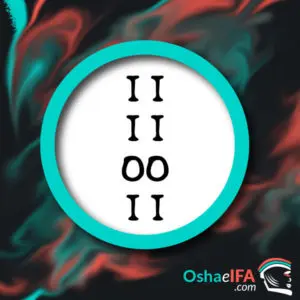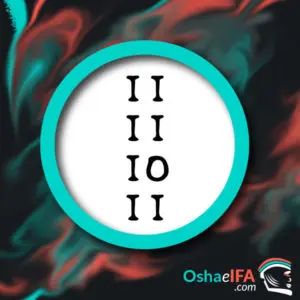Irete Suka (Ìretè Òtúrá)

Irete Suka (Ìretè Òtúrá) is Odu number 224 in the Lordly Order of Ifá. This Odu teaches us that a person with a stubborn mentality runs the risk of going from freedom to slavery. His disbelief towards the saints could lead to divine punishments, highlighting the importance of humility and faith before the divinities.
Analysis and Reflection of the Ifa sign Irete Suka
Irete Suka is distinguished by its call for introspection and self-evaluation. He reminds us of the impermanence of freedom and how easily we can fall into slavery to our own actions, decisions, and, at times, indifference to divine commands. This Odu teaches the importance of the head (ori) as the seat of the soul and destiny, emphasizing that without a clear and consecrated "head", our blessings may remain unattainable.
Economic Aspects
From an economic perspective, Irete Suka warns against the danger of neglecting our spiritual responsibilities and obligations. This Ifa sign highlights the need to align our actions and economic decisions with our spiritual values and principles, suggesting that material success is inseparable from spiritual balance and harmony.
"Salud"
In terms of health, Irete Otura calls for constant vigilance against physical and spiritual illnesses. He proposes a holistic approach to health care, including both conventional medical treatments and spiritual solutions, highlighting the importance of rituals and sacrifices to maintain health and well-being.
Religious Aspects
On the spiritual level, Irete Suka emphasizes the crucial importance of honoring and following consecratory practices and ancestral teachings linked to the Orishas. The stories and origins revealed, such as the ceremonies led by Oduduwa and Shango, as well as the emergence of Elegua, reveal the deep connection between the cosmos, the divine and the human. This Odu invites us to maintain a firm commitment to our spiritual responsibilities, as a means to guarantee the guidance, protection and favors of the Orishas on our path.
Personal Relationships (Love)
In the area of love and personal relationships, Irete Suka teaches about the complexity of human emotions, such as jealousy, and the consequences of our impulsive actions. This Odu advises care and consideration in our interactions with loved ones, promoting honesty, loyalty and respect as pillars of healthy and lasting relationships.
General description of the Odu of Ifa Irete Otura (Irete Suka)
Names or Nicknames:
- Irete Otura.
- Irete Osuka.
- Irete Suka.
- Irete Sukankola.
What is born in the odu of Ifá Irete Suka?
- Iyáremo, mother of Oduduwa.
- The transition from being free to slave.
- That Olófin cannot bless what has no head.
- The monogram on clothing.
- The secret service.
- Military service and the dance of death.
- Part of the consecrations of Osha by Oduduwa and Shangó.
- Place a metal shroud on Eshú and Obatalá.
- The manufacture of the Irete Suka okpele from ivory or bone from Ayapá.
- The deformed birth of Elegua.
- Dasoyi (Azójuano) headed towards Dahomey.
- Agroniga Omobi Tasa, the strong and young man, son of the Awan.
- Ayalala, the power of Irete Suka's sorcery, secret gudote casserole delivered by Jebioso and Azójuano.
- The secret of the metamorphosis of the skin.
- The Agbani (deer) who transformed into a great maiden.
What does the Irete Suka sign talk about?
- The three female trees: Wanko (Omó de la Palma), Wanka (Omó del Guama), Wankarika (Omó de la Aroma) and her husband, the male Jagüey, who does not dominate any of them.
- The importance of the Awó always using the Ileké of Obatalá.
- If Oduduwa's son does not ride and has conditions, he is given direct Ifá; Otherwise, it is made Oshanlá or Obanla.
- Iwan Kirigui, Iwan Karika, Iwan Kawanka, the three powers of the Omó of Oduduwa represented by three agboranes.
- The son of the sacrifice, maiden blood for the rites of Alabuweye (an Oduduwa).
- The Eri Bawa Lode land, "The great path of blessing", that Orunmila, Shangó, and Obatalá offer to Ogue through Egún.
- Naná Burukú assists the person in freeing themselves from marital pressures and solving problems.
- Akopera Awó, godson of Apekankola, who betrayed his godfather.
- The need to carry out a great ceremony to avoid failure.
- The creation of an okpele with a gold chain for Irete Suka, with Inshé Osanyin on the right leg.
- Near-death situations.
- Obatalá lowers the spirits from Heaven to Earth without anyone realizing it, which gives rise to spiritual foreboding.
- The coexistence of Iyanya and Ibaomi after the Awó turns 7 years old.
- Oduduwa gives more than half of his children to Oshanlá.
- Conflicts between friends over a child.
- Obatalá's blessing to the young Awoses for their ashé.
- Communication through the Dambe jars.
- The vicissitudes of the character due to his game and ignorance.
- Luck comes from Obatalá.
- Obatalá's contempt for the Earth for doubting his children.
- The difference in treatment between the husband and the lover.
- The transformation of the snake into a beautiful young woman.
- Orunmila turns Ikú into a man of Ifá, his subordinate.
- Exposure of leather to the sun.
- The transfer of the ashé from Osanyin to Orunmila.
- Betrayal between friends.
- The abnormal birth of Elegbá in a cursed land.
The sign Irete Otura points out:
- Oshanlá's blessing to Elegbá: it will serve both good and evil.
- The curse of Eshú to the children of Yanza.
- The epidemic in the Iyesa land, appeased by the Omó of Azójuano.
- The suffering of Irete Suka's wife due to hunger and abuse.
- The children of Oduduwa with Holy fact have two guardian angels: Oduduwa and Obatalá.
- The danger that men face in the world.
- The imposition of a gag on Baba for speaking more than necessary.
- The forbidden land.
- The search for the otá of the river and the offering of pigeons with the jar of river and coconut to the shilekún ilé.
- The consecration of Agroniga Omobitasa with Ibako, his Osanyin, according to the Treaty of Azójuano.
- Oduduwa Alabuweye.
- The herbs are: Don Shayo, Aberikunló, Jagüey macho, Guamá, Palma and Aroma.
The Essence of Elegua: Discover the importance of Elegua in Yoruba religious practice and how it influences everyday life. Read more here.
Recommendations of the Irete Suka sign:
- Maintain Faith in Ifá: Prioritize spiritual guidance and Ifá teachings over other interests or beliefs.
- Maintain Spiritual Balance: Perform the sacrifices and rituals necessary to maintain harmony with the Orishas and the spiritual world.
- Respect for Traditions: Honor the consecrations and follow the precepts established by Oduduwa and Shango, as well as other Orishas.
- Spiritual Protection: Always wear the Obatala necklace and make offerings to Eshu and Obatala to ensure their protection.
- Be careful with Relationships: Avoid situations that may lead to love or family conflicts, especially those that may result in jealousy or betrayal.
- Health Surveillance: Attend to both physical and spiritual health, seeking balance and prevention of diseases.
- Value Life and Liberty: Reflect on the value of freedom and the ease with which it can be lost, encouraging conscious and responsible decisions.
Prohibitions of Irete Suka (Otura):
- Neglecting Divine Commands: Ignoring the teachings and rituals prescribed by Ifá can lead to imbalances and losses.
- Neglect of Religious Obligations: Neglecting spiritual or religious responsibilities can result in loss of protection and blessings.
- Neglecting Health: Ignoring signs of health problems or delaying medical or spiritual treatment is highly discouraged.
- Betrayal and Disloyalty: Acting treacherously towards godparents, family or friends is strictly prohibited and carries serious consequences.
- Abuse of Freedom: Falling into excess or abusing the freedom granted can lead to slavery to vices or adverse circumstances.
- Despise the Earth and its Teachings: Lack of respect for nature, the Earth and its resources can result in personal and collective misfortunes.
- Ignore Warnings: Failure to heed spiritual signs and warnings can lead to disasters and irrecoverable losses.
Irete Suka teaches us the importance of obedience, humility and respect for spiritual commands, and highlights the need to live a life aligned with the principles of Ifá to ensure well-being and prosperity.
You can read: Treatise of the sign of Ifa Otura Tiyu
Sayings of Irete Suka:
- King's head, child's brain.
- Go from free to slave.
- Life does not move with the movement of death.
- Luck and fortune are suspended in the air.
- The Awó transcends life because he knows the right path.
The saying “King's head, child's brain” tells us something very simple: no matter how big your crown is, if you think like a child, you are not going to make good decisions. Sometimes people with power think they already know everything, but this saying reminds us that having power doesn't mean you automatically know what to do.
Looking at the story of Irete Suka, who brought headless sacrifices to Olofin, we see the same problem. They did things without thinking, always in the same way, expecting different results. It's like trying to open a door with the wrong key over and over again. This saying and history teach us that it is not enough to do things just to do them; You have to stop and think and learn from what didn't work before.
Says Ifa odu Irete Suka:
This person's life is marked by a series of challenges and adversities that seem to follow him at every step. From itchy skin spots to losing his luck after giving a child to someone else, his path is full of obstacles. His relationship with his family is complicated, he was not raised by his mother and he has an inheritance object that carries emotional weight. He has survived a serious illness that almost cost him his life and is characterized by a revolutionary personality, which leads to constant conflicts and disruption of his home. Furthermore, his business is not prospering and he has extended his help to those who now become his enemies, causing him harm.
In your environment, secrets and betrayals lurk, urging you to be cautious and protect your privacy. He must worship Obatalá, who has rescued him in times of need, and thank the Ibeyis for protecting him. His warning is clear: avoid committing yourself to situations that could lead to slavery due to lack of discernment, and be alert to pitfalls in love relationships and travel. Justice and betrayal can discover him if he does not remain faithful to his principles. The key is to keep intimate secrets and value relationships, especially with elders, while navigating the complexity of establishing romantic bonds. On this journey, the Orishas guide you, reminding you of the importance of fidelity, respect and wisdom in every decision.
Prayer of the Odu Irete Suka:
Irete Suká Apekankola Adifafún Akopera Ewere Oddé Obiní Kuaye Awonifa Obarabaniresun Moyare Oyebi Oyebifa Orunmila Orugbo.
Suyere (Song):
ADAJA LIYE OFE AYO AIYE MONK IKABELA SHASHEN IRETE SUKA OBASHE
Ebbo (Inshe) of Irete Suka to unify marriage.
To strengthen and unite marriages through the wisdom of Irete Suka, a specific Ebbo is performed that invokes the blessing of Oshún, the deity of love and fertility. This ritual begins with the preparation of Inshé Ozayín, a powerful amulet designed to harmonize relationships. Two doves are used, one male and one female, representing the union of the couple. After the Ebbo, they are offered to Oshún and their hearts are extracted, in which the names of the couple are inserted, symbolizing their deep connection. This union is reinforced with five pins, which symbolize the five senses, essential in mutual perception and understanding in the relationship.
The hearts are wrapped with white and yellow threads, colors that represent purity and prosperity, along with ingredients such as voice-changing stick, ayuá, and Paramí, which strengthen communication and protect the bond. This package is placed in a sealed container with quicksilver, lodestone, and iron filings, materials that attract and maintain strength and stability in the union. Finally, he gives himself to the sea, in a symbolic act of liberation and surrender to the sacred depths, asking that the couple's love be as immense and deep as the ocean.
You can read: All about the Odu Irete Meyi
Treatise and meaning of the Odu Irete Suka (Otura):
The Odu Irete Suka offers solutions for diseases. Kaferefún Oshosi, Oshún and Orunmila.
Women under this sign may experience difficulties conceiving, and there is a risk of malformations in children. Obiní suffers from problems in her womb and hemorrhages.
The risk of child abduction or abandonment by parents due to complex romantic relationships is mentioned. It is recommended to welcome the Ibeyis and make offerings to Oshún with two doves to strengthen the marital union.
Men can be recruited into the army, and people of this Odu are often employed as spies. It is suggested to perform Yoko Osha for protection.
The Santo Domingo mamey shell is used to attract prosperity as part of the Inshé Ozayín.
Irete Suka harshly criticizes the nature of the world, describing it in a negative way.
The Awó, known for his ability to interpret the Odu of Ifá, must overcome memory problems and pay attention to his own sufferings, including genetic problems such as Mongolism.
Mistakes tend to be repeated, and the support of Obatala for success. Obatalá, who connects with the celestial spirits, is essential for the development of spiritual intuition.
Family conflicts and risks of serious injury or poisoning are prominent, making it vital to avoid near-death situations.
Addiction to pleasures and love relationships demands caution, especially to avoid betrayal.
It warns against eating spoiled legumes, especially red ones, and highlights curiosity as a possible path to self-destruction.
The Irete Suka opkéle, made with a gold chain and kept in a silver chest next to Orunmila, is made from Ayapá.
It is essential to protect children from negative external influences and address the mother's mental health problems, especially related to childbirth.
Skills in pottery, art, medicine and healing are highlighted, as is the importance of sincere devotion to divinity.
Inappropriate behavior towards one's partner and doubt towards one's children can lead to fatal consequences, including the risk of drowning from the wrath of the saints.
The elements of the mockingbird and the tomeguin are used to attract a mate, while spiritual vigilance is constant.
Inshé Ozayín is recommended to ensure the woman's tranquility in the relationship, warning about the dangers of arrogance.
Iyaremu, the mother of Oduduwa, offers her protection to the children of this sign, while Orunmila ensures world stability by order of Olófin.
The shift from human to animal sacrifices in Oduduwa rituals marks an evolution in spiritual practices.
Irete Suka is a savior for women, offering solutions through birth or the power of Ifá, although she faces criticism and challenges within her community.
The importance of offering fish blood to Egún, accompanied by pepper, is emphasized to appease the ancestors.
You can read: All about Shango, the God of Lightning
Irete Suka Ifa Traditional
ÌRETÈ ÒTÚRÁ
Oká ni ò jé á fowó ra òun lórí I béjé I béjé
Òsùùsuù ni ò jé á forí òun sònà
A day fún Òrúnmìlà
Ifá n sòwò omo lórí Apá
Ó sówó omo lórí Apá
Béè ni ò gún
N lo rèé sòwò omo lórí Ooro
Ó se lórí Ooro béè ni ò gún
Òrúnmìlà bá lo sórùn Òpè
Òun le bímo báyìí?
I still see myself lórí Apa
ko gun
Un se lórì Ooro
kò yàtò
Orùn Òpe túun n lo yìí?
Wón ní kó ru igbá àdému
Kó sì ru òwú
Wón ní kí wón ó wá ká òwú òhún Sínú igbá àdému
Ngbà or dórí Òpe
Ni bá n bimo
Òun náá
Ní bá n yin àwon Oká ni ò jé á fowó rà un lórí
Àwon Òsùùsuù ni ò jé á fori òun sònà
A day fún Òrúnmìlà
Ifá n sòwò omo lórí Apá
Ó be lórí Apa
Béè ni ò gún
N ló ba ré kété ló bó sórí Ooro
Ó be lórí Ooro
Béè ni ò gún
Òrúnmìlà bá lo sórùn Òpè
Ó dórùun tÒpè ní bá n bímo
Ta ló bímo báwònyí beere?
opè
Òpè ló bímo báwònyí beer
opè
Èdú è yàgàn
Gbogbo wá láá dolómò
Èdú è yàgàn.
Ifá wishes the good fortune of children for this person. Ifá sees a woman whose daughter is in the hands of her third husband. This person should offer sacrifice for the daughter so that her life is not ruined.
The Cobra hates the person who rubs his head with his hand
The thorns Òsùùsuù detest the one who walks on it
They were the ones who made divination for Òrúnmìlà
When Òrúnmìlà will trade with children on Apá
He will trade with children on top of the Apa tree
He traded with children on the Apa tree
But it hadn't been successful
He went to trade with children on the Ooro tree
He did it on Ooro but had no success whatsoever
Òrúnmìlà went to the neck of Òpè
And he asked, 'Will I be able to have children?'
'I tried to do it on the Apa tree'
'And I was unsuccessful'
'I tried to do it on the Ooro tree'
'It was no different'
'But this is the neck of Òpè'
They advised him to offer sacrifice with a special type of gourd called 'Àdému'
He was advised to offer also with cotton cloth
The cotton fabric then had to be rolled lengthwise, stretched and rolled into the Àdému
When he reached the neck of Òpè
He started having children
Surprised he exclaimed 'Yo!'
He began to praise his priests Oká ni ò jé a fowó ra òun lórí i béjé i béjé
And to the priests 'Òsùùsuù ni ò jé á fori òun sònà'
They were the ones who made divination for Òrúnmìlà
When he would trade with sons in the Apa tree
He did it on the Apa tree
But it was unsuccessful
He then went to climb the Ooro tree
He made it over the Ooro tree
And it was unsuccessful
He then went to the neck of cuellopè
He got to the neck of Òpè and began to have children
Who has had that little bit of children?
opè
It is Òpè who has had that little bit of children
opè
Èdu can never be sterile
All of us definitely become nursing mothers
Èdú can never be sterile.
Patakies (Stories) of the Irete Suka sign
The Princess, from free, becomes a slave
There was a princess who had an affair with a prince, with the help of a maiden as an intermediary. The princess became pregnant and, seeking to hide her disgrace, she decided to send the child to the mountain wrapped in a sheet with the royal emblem, just when the prince was to leave for war, promising him marriage upon her return.
Some farmers found the child and took him in. Upon returning victorious, the prince demanded to see his son. Upon discovering the princess's act, he publicly disowned her and expelled her from court, stripping her of her status. Through one side, the prince recovered his son, who was raised by the maid who had been an intermediary in their relationship. In time, the prince married the maiden, and the princess, fallen from grace and misery, was forced to ask him for work in exchange for food.
Explanation: This story highlights the importance of facing the consequences of our actions and the futility of trying to hide the truth, especially when it involves responsibilities as great as that of a child. It reminds us that impulsive decisions and the desire to hide our mistakes only lead to unfavorable results and often to ostracism and the loss of our position and dignity. The story also reflects how actions guided by fear and dishonor can radically transform someone's life, from having a privileged position to facing the harshness of reality without support. The princess, acting impulsively and under the weight of her shame, not only lost the prince but she was also reduced to a life of servitude, a fate she could have avoided with honesty and bravery.
The Secret Service was born
There was a king whose wife could not conceive, which led him to seek the help of Orunmila, who performed an ebbó. At the palace, a maid caught the king's attention, sparking tensions when other maids reported to the queen. Out of jealousy, she sent the maid to spy and they discovered that she was pregnant after a visit to the doctor with the king. To hide the scandal, the king suggested that they pretend that the maid was the wife of one of his servants. However, when the maid gave birth to a child, the queen, upon learning about her, orchestrated a plan to kidnap the baby, taking advantage of a moment of distraction.
The king, desperate, offered a reward to find his son. Meanwhile, a man in difficulty visited Orunmila, who predicted that he would find the child in the bush, along with a sack of money, as part of his destiny after performing an ebbó. Upon finding the child and the money, the man returned the heir to the king, who, after discovering the queen's plot, decided to forgive her but severely punished her accomplices. The queen, known as Eregrigri, and the savior, Ifá Kadashe, mark this story of betrayal, redemption and justice.
Explanation: This story highlights the importance of integrity and truth in the midst of adversity and deception. It demonstrates how actions driven by jealousy and envy can lead to disastrous consequences and how wisdom and justice ultimately prevail. It teaches that, despite intrigues and challenges, truth and innocence find their way to the light, reminding us of the importance of facing our problems and conflicts honestly and seeking spiritual guidance to overcome obstacles. Additionally, it highlights the value of mercy and forgiveness, even in the face of betrayal, and how these can restore harmony and order within a community or family.















Good morning. Thank you for the information. Excellent and Clear Prediction. Iburo iboya. Happy new year
Pingback: Letter of the Year in Cuba: Delving into the paths of Ifá - La Joven Cuba